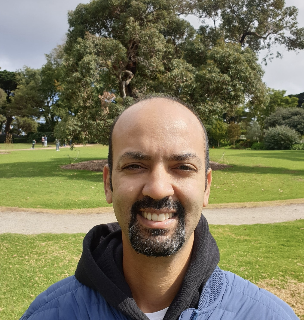Date
2pm – 4pm (AEST)
REGISTER
This is an online Zoom event. Register for this event on Eventbrite: https://www.eventbrite.com.au/e/ai-and-machine-learning-in-imaging-showcase-event-1-tickets-157185057739
About the Showcase
The ARDC Machine Learning Showcase is an opportunity to identify common opportunities, gaps and challenges in applying ML, that can be resolved collaboratively through ML CoP.
This event is also an opportunity to display the projects that have successfully applied ML to their research or are on the road to doing so.
This is the first event in a series that will feature lightning talks across the entire spectrum of machine learning. This first event of the series will feature two NCI users presenting their work. Details are below.
Dr Tu Le (RMIT)
Talk: Weaving through the boundless material space with machine learning
The design and synthesis of materials with useful, novel properties is one of the most active areas of contemporary science, generating a veritable explosion of scientific activity in areas such as biomaterials, cell and tissue engineering, organic photovoltaics and light-emitting materials, and nanomaterials for a myriad of medical and nonmedical applications. This new era of materials design and discovery covers many disciplines from chemistry and biology to physics and engineering. To accelerate the pace of novel materials discovery, computational methods such as artificial intelligent machine learning techniques can be used to construct predictive materials property models and allow rapid scanning of large chemical datasets to systematically identify attractive candidates for specific applications. This presentation will showcase my tiny exploration in the vast material space in the search for functional materials for applications such as aerospace and antifouling materials.
About the Presenter
Dr. Tu Le is a Lecturer at the School of Engineering, RMIT University. For the last decade, her research has been focused on applying machine learning approaches to design and develop functional materials. The goal of these projects is to efficiently design fit-for-function materials by mapping the relationship between materials structures or processing conditions and their physicochemical properties. The application of these materials varies from drug delivery, anti-fouling coating, to hydraulic fluid for aircrafts. Her research impact and contributions have been recognized through many awards and grants, such as the Jacques-Emile Dubois award, CASS Foundation travel grant, and the joint Japanese Society for the Promotion of Science – Australian Academy of Science grant for attending the HOPE meeting with Nobel Laureates.
Dr Sherif A. Tawfik Abbas
Talk: Rapid material discovery with machine learning
A major challenge in materials science is to find the right material for a given task. The space of possible new materials is endless, and researchers around the world have been populating online materials databases with millions of materials along with their predicted properties. Therefore, if an experimentalist is looking for a material with a particular set of requirements, it is in principle possible to find a material that could nearly match those requirements by searching the databases. The databases have been quite useful: many of the materials in these databases have been predicted to be potential candidates for applications in many areas such as photonics, medicine, superconductivity, energy and programmable materials.
However, some material properties are still not available in those massive databases. Thermal properties are available only for a very limited number of materials because they are highly complex to calculate. And while two-dimensional (2D) materials are available, hybrid 2D materials are not there yet, and therefore it is not possible to predict the properties of the possible 20 million hybrid 2D materials. Machine learning is a powerful approach that can help predict complex materials properties, and has recently been attracting attention owing to the high accuracy of its predictions and the versatility of its applications. Here I will demonstrate how we use machine learning to accurately predict thermal properties for materials as well as the properties of hybrid 2D materials. I will also give an overview of my current research at the Institute for Frontier Materials for my work in the ion battery domain, and the ARC Centre of Excellence for Exciton Science for predicting properties related to photovoltaic materials.
About the Presenter
Dr Sherif A. Tawfik Abbas holds a PhD of Physics from the University of Sydney (2017) and is currently an Alfred Deakin Postdoctoral Research Fellow at the Institute for Frontier Materials at Deakin University, and an Associate Investigator at the ARC Centre of Excellence for Exciton Science. He works at the cross-roads between first principles computations, material science and machine learning to answer questions in photovoltaic materials, artificial synaptic junctions, and battery materials.

